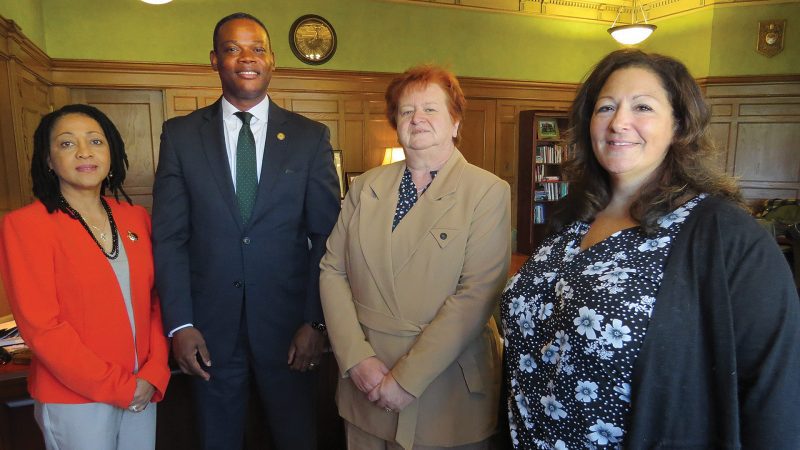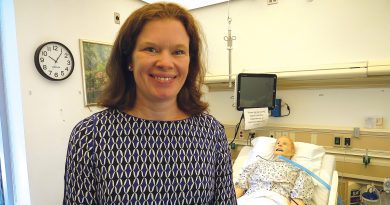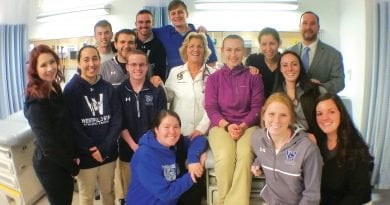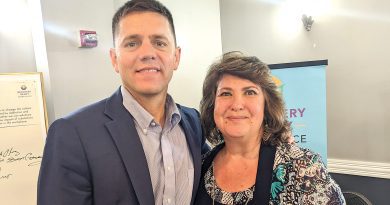Haiti Nursing Program Lets Students, Elms College Extend Their Reach
Learning Experiences
Pictured in photo at top: Spearheading the Haiti Nursing Continuing Education Program are Elms College officials, from left, Anne Mistivar, project faculty coordinator and cultural consultant; President Harry Dumay; Maryann Matrow, director of School of Nursing Operations; and Deanna Nunes, assistant clinical professor and associate dean of the School of Nursing.
Harry Dumay says the initial talks began more than four years ago.
They involved nurse educators in Haiti and leaders at Elms College, including Dumay, who is from Haiti, and they centered around how Elms, which has a strong Nursing program, might be able to partner with those in Haiti to continue the education of nurses in a broad effort to improve health outcomes in that country through nurse-faculty development.
Through a $750,000 grant from the W.K. Kellogg Foundation, a partnership between Elms and the Episcopal University of Haiti School of Nursing (EUH) was created that brings together nurse faculty from across Haiti and uses a ‘train-the-trainer’ approach to instruct the faculty with leading-edge nursing skills.
To date, more than 47 nurses in two cohorts from all provinces of Haiti have gone through the program — there was an elaborate graduation ceremony in May for both groups — and a third cohort has begun, with a fourth and perhaps more planned, thanks to a second grant from the Kellogg Foundation for $1.1 million.
That is the short, as in very short, version of a truly compelling story.
The longer version involves how all this has been accomplished during a time of global pandemic and an earthquake, a severe hurricane, and extreme political upheaval and general unrest in Haiti, including the assassination of the country’s president, Jovenel Moise, more than a year ago.
In short, very little about this initiative has been easy, but those involved — here and in Haiti — have persevered because the stakes are high and need to train nurse faculty is great, said Dumay.
Elaborating, he noted that the original model for this program called for in-person learning, with educators from Elms flying to Haiti once a month to lead classes.
Those plans were eventually scrapped because of the pandemic and other factors, including safety issues, in favor of a remote-learning model that came with its own set of challenges, especially the securing of needed equipment (tablets, hotspots, and even solar chargers in case power was lost) and getting them in the hands of the students who would use it.
And these issues were compounded by other challenges, including those aforementioned natural disasters and the general upheaval in the country. Some students had to stay at their workplaces to take part in the classes because the WiFi was better there; meanwhile, class times were shifted so that students wouldn’t be traveling after dark to take them because of the increased risk to their own safety.
But, as noted, all those involved have pushed through these challenges because of the importance of this training. Indeed, most healthcare in Haiti is provided by nurses, not doctors, so the need to train nurse educators and thereby heighten the skills of those providing care is paramount.
People like Lousemie Duvernat, a nurse who was part of the second cohort that went through the Elms program. Via Zoom and through an interpreter — Anne Mistivar, project faculty coordinator and cultural consultant for what has come to be known as the Haiti Nursing Continuing Education Program — Duvernat said the program, and, specifically, its ‘train-the-trainer’ approach, has made her a better nurse, not to mention a better educator.
“The Elms program was very helpful because in Haiti they don’t have this type of training for nurses,” she explained. “They have nurses that are in different specialties and in different roles, and they find themselves teaching, but they’ve never been taught how to teach, so this program is very important because they are learning how to be an instructor.
“This, in essence, has helped them to understand the students, how to deliver the message, how to present, and how to evaluate the students and make them better educators,” she went on, adding that she would like to see the program continue because they simply don’t have anything like the ‘train-the-trainer’ approach in Haiti.
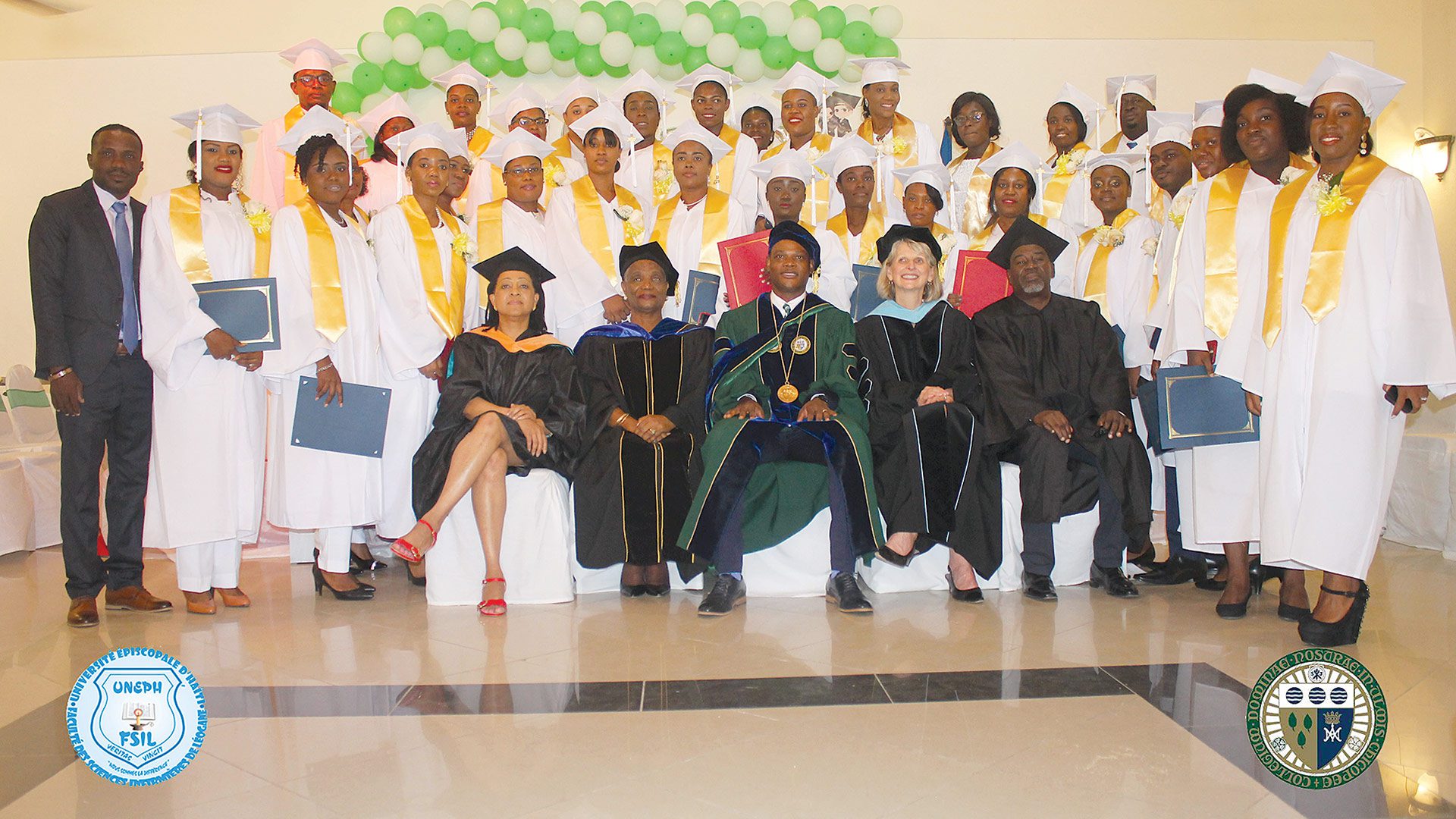
Such sentiments clearly explain why this initiative was undertaken and why it has persevered through so many extreme challenges, said Deana Nunes, associate dean of the School of Nursing and assistant clinical professor at Elms and nurse educator and course faculty for the Haiti Nursing Continuing Education Program, adding that the results thus far have been encouraging on many levels, but especially in what she called the “thirst for learning” she has seen from the nurses from Haiti who have been involved with the program.
For this issue and its focus on healthcare education, HCN takes an in-depth look at this inspiring program, its goals, and the many ways in which success is being measured.
Course of Action
Duvernat — again, through her interpreter, Mistivar, who is also from Haiti — told HCN that, since she was a child, she harbored dreams of becoming a doctor. In Haiti, though, the road to that profession is long and difficult, and she eventually set her sights on becoming a nurse, a vocation that, as noted, brings even more responsibilities than it does in this country.
But, and also since childhood, she has wanted to be an educator. And these twin passions, coupled with her desire to help others, have now come together as she advances her career as a nurse educator, with the goal to one day earn a doctorate — a path that has been accelerated and helped in many ways by the Haiti Nursing Continuing Education Program and its heavy emphasis on those words ‘continuing education.’
Elms College has a great School of Nursing and a strong reputation in the area for preparing great nurses and healthcare professionals in general. But Elms College has also had a desire, and some efforts, in reaching outside Chicopee, outside Massachusetts.”
This is what all those involved with the initiative had in mind, said Dumay, noting that the program was born out of need, one that he was quite familiar with, and a desire among those at the college to meet that need.
“Elms College has a great School of Nursing and a strong reputation in the area for preparing great nurses and healthcare professionals in general,” he said. “But Elms College has also had a desire, and some efforts, in reaching outside Chicopee, outside Massachusetts; some of our students have gone to Jamaica for clinical programs, and we’ve had conversations with our partners in Japan around global health initiatives.
“I’ve also had interactions and collaborations with those in higher education in Haiti, and I’ve also had interactions and collaborations with the Kellogg Foundation,” he continued, while explaining the genesis of the initiative in that country. “And I know that one of the strong desires of the Kellogg Foundation has been to support the reinforcement of human resources for health in Haiti, particularly around the support of maternal and child healthcare.”
Looking at those synergistic aspirations and competencies, it was natural to propose to the Kellogg Foundation to help Elms in efforts to reinforce nursing education in Haiti, he continued, adding that the pieces eventually fell into place for what would become the Haiti Nursing Continuing Education Program, for which Elms would partner with the Episcopal University of Haiti and its school of Nursing.
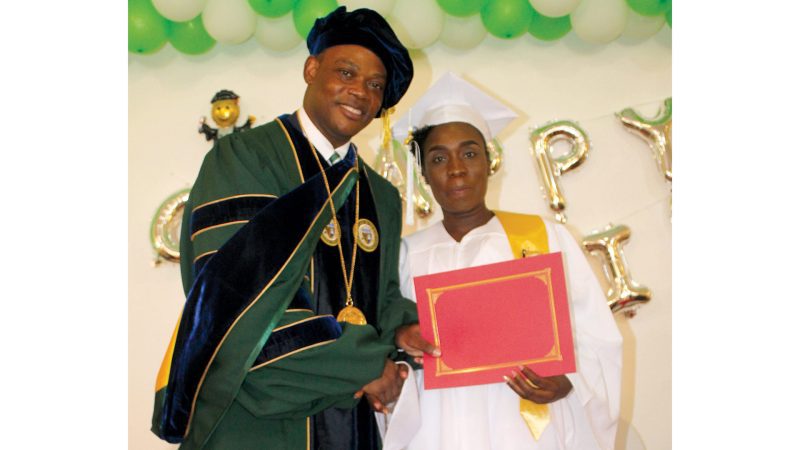
That was back in early 2019, said Dumay, adding that there were visits to Haiti by officials at Elms and those with the Kellogg Foundation to explore the facilities of the Episcopal University of Haiti’s School of Nursing and meet with officials there to brainstorm about how the initiative could take shape.
Eventually, continuing education for nurse educators became the focus, he went on, adding that a ‘train-the-trainer’ model was identified as the most effective course of action — figuratively but also quite literally.
“We know that a lot of the nurse educators in Haiti are at varying degrees of preparation, and we heard from our partners from the healthcare system in Haiti that the nurses that are coming out of the various schools of nursing in that country have varying degrees of preparation as well,” Dumay explained. “So helping to reinforce the capacity, the level, and the preparation of nurse educators in Haiti so that they, in turn, can teach the nurses who are on the front lines became the concept that we created.”
With a $750,000 grant from the Kellogg Foundation, plans were put in place for two cohorts of 24 faculty members from approved nursing schools across Haiti to take part in this ‘train-the-trainer’ program, he noted, adding that the original plan was for in-person classes at the Episcopal University of Haiti — specifically a “very intense” once-a month model.
Obviously, this plan had to change, because of COVID but also other factors, including the growing danger of traveling from one province to another in Haiti, said Dumay, noting that the program was halted at one point as plans were developed for an online format. This was a challenging adjustment because of the need to provide the nurse educators with needed equipment in the form of laptops and hotspots — and then actually getting this equipment into their hands, an assignment fraught with challenge on many levels, from the transportation and safety issues to the pandemic itself.
“We worked with and leveraged the network of the telephone company in Haiti, which has stores throughout the country,” he said. “We worked with them to coordinate the distribution of the technology to individuals all across Haiti; it was a logistical feat to be able to have all of the students have access to that material so they could complete the program.”
Overall, said Mistivar, the move to a remote format provided other learning opportunities.
We had to adjust our course time because, once darkness comes, it becomes much more dangerous. It became an example of the ways we had to work with our students to make sure we were not only providing them with a great education, but also keeping them safe.”
“Not only did they learn about nursing, but also about technology,” she told HCN, adding that the students were nurses representing all 10 provinces in Haiti. Some were already nurse educators, and many were working in various hospitals. Some had bachelor’s degrees, while others had a master’s.
The common denominator was that they wanted to take their education, and their ability to train others, to a higher level.
School of Thought
Nunes told HCN that the shift to remote learning in Haiti was similar to what was happening at Elms College and other schools in this country during the pandemic. But there were many subtle, and not so subtle, nuances and adjustments that had to be made.
“Each week, on Wednesday afternoons, we met with the students via Zoom,” she explained. “We had to adjust our course time because, once darkness comes, it becomes much more dangerous. It became an example of the ways we had to work with our students to make sure we were not only providing them with a great education, but also keeping them safe.”
Overall, the nurse educators displayed great resilience, she went on, and a strong desire to learn, despite the many challenges they are facing in their daily lives, because they understood its importance to them becoming better educators and nurses — and perhaps advancing in their careers.
This resilience, desire to learn, dedication to helping others, and the knowledge and experience they already brought to the table certainly made an impression on those at Elms.
“Speaking with them, it was just fascinating to learn the way Haitian medicine and nursing care is delivered, and the amount of experience these nurses have is incredible,” Nunes told HCN. “For me, as an educator, I feel I learned so much from them in addition to what they learned from us.”
As she talked about what was taught, and how, Nunes said there was prepared curriculum, obviously, but those leading the courses would often take their cues from the students, the nurse educators.
“One of the courses I taught was ‘Health Assessment,’ and in the beginning, we asked them, ‘what do you want?’ she recalled. “One of the things they identified was maternal health, but one of the things that surprised me was that they wanted to know more about how to use a stethoscope because, in Haiti, they said, the physicians do that.
“But they wanted to become more competent as nurses and develop that skill, so we were able to provide resources online, such as videos that demonstrated the sounds they’d hear and where to listen, things like that. In the development of our curriculum, we wanted to integrate knowledge in addition to keeping the focus on how to teach this knowledge.”
This same approach is being used with the third cohort of nursing educators, which just began its course work several weeks ago. This latest chapter in the story has provided more insight into the many challenges to be overcome, and more lessons in perseverance, said Maryann Matrow, director of the School of Nursing Operations at Elms and project co-manager for the Haiti Nursing Continuing Education Program.
She noted, for example, that some students were held up on the road as they traveled to the kickoff for the third cohort, but eventually made it there safely. She also noted some the difficulties in getting new models of laptops to the students that will be using them.
“Once we found and ordered it, things began to get more difficult in terms of travel and delivery,” she said. “As for the kickoff ceremony … to be able to get the people there was trying.”
Despite all this, the attrition rates for the first two cohorts were extremely low, only a few students, said Matrow, adding that she attributes this to everything from that thirst for knowledge that all those involved recognized to the strong support system involving those in both Haiti and Chicopee that has helped students make it to the finish line.
For Duvernat, the challenges involved in taking part in this program went beyond transportation, navigating around extreme weather, and coping with crime. She also had a baby during the course and was working full-time as well, adding up to a juggling act and very stern test that she and others have passed.
“Life in Haiti is very stressful,” she said through Mistivar. “Every day, people have to deal with that stress, which makes them resilient and able to adapt. I was motivated to continue to attend the class because it was something that was very important to me. I tried to focus on the experience because I did not want to miss the opportunity.”
Bottom Line
While there are many words and phrases that can be used the describe the Haiti Nursing Continuing Education Program, including all those in its title, ‘opportunity’ probably sums it up the best.
For those in Haiti, it is an opportunity to continue their education and, as Duvernat said, learn how to become better teachers. Meanwhile, for Elms College, it is a chance to extend its reach and its ability to make a difference in the lives of others, well beyond Chicopee and Western Mass.
In short, it has become a learning experience on many levels and for all those involved. It is a compelling story that hopefully has many new chapters still to be written.

